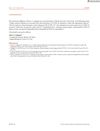 7 citations,
December 2020 in “Clinics in Dermatology”
7 citations,
December 2020 in “Clinics in Dermatology” Some alopecia treatments might help treat COVID-19, but more research is needed.
[object Object] May 2023 in “Clinical and translational neuroscience” Tailored neurorehabilitation programs improve life quality for post-COVID-19 patients.

Social media data can help track and predict COVID-19 symptoms and trends.
 April 2022 in “International journal of respiratory and pulmonary medicine”
April 2022 in “International journal of respiratory and pulmonary medicine” People with lower levels of free testosterone tend to have worse COVID-19 outcomes.
 3 citations,
March 2021 in “Journal of the European Academy of Dermatology and Venereology”
3 citations,
March 2021 in “Journal of the European Academy of Dermatology and Venereology” The letter is skeptical about the effectiveness of anti-androgen therapy for COVID-19 and calls for strong evidence from clinical trials.
 February 2022 in “International journal of KIU”
February 2022 in “International journal of KIU” Certain genes and nutrients like vitamin D, zinc, and omega fatty acids affect COVID-19 severity and infection risk.
 77 citations,
July 2020 in “European Journal of Clinical Pharmacology”
77 citations,
July 2020 in “European Journal of Clinical Pharmacology” Blocking the virus's entry into cells by targeting certain pathways could lead to early COVID-19 treatments.
 January 2023 in “Sibirskij medicinskij vestnik”
January 2023 in “Sibirskij medicinskij vestnik” Women with PCOS are more vulnerable to severe COVID-19 and related health issues.
 April 2022 in “Brazilian Medical Students”
April 2022 in “Brazilian Medical Students” People with androgenetic alopecia may have a higher risk of severe COVID-19.
 November 2020 in “Journal of The American Academy of Dermatology”
November 2020 in “Journal of The American Academy of Dermatology” Men with male pattern baldness may be more at risk for severe COVID-19, and anti-androgen treatments could offer protection.
 3 citations,
November 2020 in “Journal of The American Academy of Dermatology”
3 citations,
November 2020 in “Journal of The American Academy of Dermatology” The document suggests that more research is needed to confirm if baldness can indicate a higher risk of severe COVID-19 in men.
 20 citations,
September 2020 in “Journal of Translational Medicine”
20 citations,
September 2020 in “Journal of Translational Medicine” Mesenchymal stromal cells may help treat severe COVID-19, but more research is needed to confirm their effectiveness.
19 citations,
February 2023 in “Public Health” Over 25% of COVID-19 patients had symptoms lasting more than a year.
 2 citations,
October 2020 in “Annals of Oncology”
2 citations,
October 2020 in “Annals of Oncology” Men may be more vulnerable to severe COVID-19 due to genetic and hormonal factors, but more research is needed.
 November 2021 in “Research Outreach”
November 2021 in “Research Outreach” Low testosterone levels may lead to more severe COVID-19 outcomes.
 3 citations,
October 2022 in “International Journal of Dermatology”
3 citations,
October 2022 in “International Journal of Dermatology” COVID-19 can cause hair and nail disorders after infection.
June 2020 in “Dermatologic therapy” Using Janus kinase inhibitors (JAKi) in COVID-19 treatment requires careful consideration due to their immunosuppressive effects.
 31 citations,
June 2020 in “Dermatologic Therapy”
31 citations,
June 2020 in “Dermatologic Therapy” Patients with chronic skin conditions on systemic treatments did not have worse COVID-19 outcomes and could resume their treatments after recovery.
 5 citations,
May 2020 in “Dermatologic Therapy”
5 citations,
May 2020 in “Dermatologic Therapy” 5-alpha reductase inhibitors might worsen lung recovery in COVID-19 patients, suggesting a pause in their use.
 10 citations,
September 2022 in “Psychiatry and Clinical Neurosciences”
10 citations,
September 2022 in “Psychiatry and Clinical Neurosciences” Long COVID affects over half of COVID-19 survivors, causing a range of symptoms like fatigue and neurological issues, with no specific treatment yet.
 113 citations,
July 2020 in “Communications biology”
113 citations,
July 2020 in “Communications biology” Men, especially older ones with health issues like prostate cancer, may have worse COVID-19 outcomes and could benefit from therapies targeting male hormones.
 25 citations,
January 2022 in “Endocrine journal”
25 citations,
January 2022 in “Endocrine journal” Long COVID patients may have hormonal imbalances linked to their symptoms.
 June 2023 in “Pharmaceuticals”
June 2023 in “Pharmaceuticals” Men and women respond differently to drugs for COVID-19, high cholesterol, and diabetes, which suggests a need for personalized treatments.
 4 citations,
April 2021 in “Experimental and Molecular Medicine”
4 citations,
April 2021 in “Experimental and Molecular Medicine” The conclusion is that certain genetic factors and blood types may affect COVID-19 severity, but changes in ACE2 and TMPRSS2 genes are not clearly linked to it.
 April 2021 in “Journal of the European Academy of Dermatology and Venereology”
April 2021 in “Journal of the European Academy of Dermatology and Venereology” The document corrects an author's affiliation in previous articles about COVID-19 and its links to hair loss and hormones.
 1 citations,
October 2022 in “European medical journal”
1 citations,
October 2022 in “European medical journal” The congress highlighted concerns about the effectiveness of over-the-counter nail treatments, the link between hair loss and daily care products, and the safety of skin treatments during COVID-19.
 October 2021 in “Journal of the European Academy of Dermatology and Venereology”
October 2021 in “Journal of the European Academy of Dermatology and Venereology” There have been major advances in diagnosing and treating hair loss over the last 30 years, with new drugs and improved hair transplant techniques.
 December 2023 in “Health Information Jurnal Penelitian”
December 2023 in “Health Information Jurnal Penelitian” Post-COVID syndrome causes long-lasting symptoms like fatigue, breathing issues, and anxiety.
[object Object]  15 citations,
August 2021 in “Reviews in endocrine and metabolic disorders”
15 citations,
August 2021 in “Reviews in endocrine and metabolic disorders” COVID-19 and hypopituitarism (reduced pituitary gland function) are linked, with the latter's related health issues potentially worsening COVID-19 outcomes, and COVID-19 possibly increasing risk for pituitary complications.
 8 citations,
May 2022 in “Journal of medicine and life”
8 citations,
May 2022 in “Journal of medicine and life” COVID-19 patients may experience hair loss, but it's not linked to their age or sex.



























